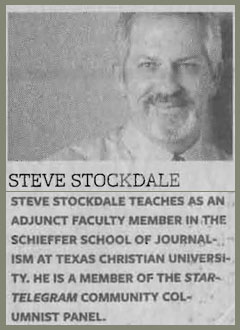 Special to the Star-Telegram
Special to the Star-Telegram
Chesapeake Energy’s impressive and expensive PR campaign has folks asking questions. Lots of questions.
One of the overlooked and under-reported aspects related to drilling in the Barnett Shale is the negative impact to our local linguistic environment.
We’re not talking particulate matter here. This is the worrisome increase in measurable propagandulate in the lower levels of what is technically referred to as the “purchased mediasphere.”
This semantic pollution poses immediate and long-term threats to the sustainability of what Stephen Colbert calls “truthiness.”
I’m talking about Chesapeake Energy’s full-frontal, body-slamming, leg-whipping, arm-twisting, head-butting propaganda blitz on behalf of the Barnett Shale.
As a 54-year-old part-time adjunct who doesn’t have anything better to do than think about these things, I’m not sure I will survive the “Summer of the Shale Sale.”
I noticed the first mildly annoying effects in the dying days of spring.
“Let’s get behind the Barnett,” intoned the serious and weathered countenance of Tommy Lee Jones. What do you mean, get “behind” the Barnett?
Then there was the release of “Citizens of the Shale,” a 30-minute “investigative news report” paid for by – Chesapeake Energy. What? An “investigative news report” paid for by a principal of the “investigation”?
In the introduction, Chesapeake CEO and Chairman Aubrey McClendon said it included “all perspectives … accurate information and fair, fact-based journalism … facts in an in-depth format … honest and balanced picture.”
I trotted out my semantic analyzing kit and measured dangerously low levels of overall truthfulness based on three samples:
- The genial “reporter” in the piece, Ginny Simone, isn’t a reporter in the journalistic sense. She’s employed by the Mercury Group, “proven practitioners of persuasive arts and science that achieve measurable results.” (www.mercgroup.com)
- My personal scientific analysis (I timed and counted) yielded startling results. In the 28-and-a-half-minute broadcast, someone is speaking for 26 minutes. Of 37 identified speakers, 33 speak favorably, two express specific concerns about urban drilling, two are opposed. The 33 proponents get 25 minutes, the other four get the other 60 seconds.
- There appears a calculated effort to say, either directly or through surrogates, that natural gas is clean and doesn’t pollute, and that developing these reserves is a patriotic duty that will “make us less dependent on foreign gas.” According to the emissions tables at www.naturalgas.org and www.cleanskies.org, natural gas emits 71 percent as much carbon dioxide (CO2) as oil and 56 percent as much as coal. It actually emits 21 percent more carbon monoxide (CO) than oil, but only about one-fifth as much as coal.
So you can truthfully say natural gas is “cleaner” and “less polluting,” but you can’t honestly say that it’s “clean” and doesn’t pollute.
The U.S. certainly relies on imported oil, but we both import and export natural gas, according to the Energy Information Administration. One type of energy commodity shouldn’t be confused with another. But there’s more:
On Aug. 1, KXAS-TV aired the hourlong production, Unconventional: The Story of the Barnett Shale, in prime time, a special program “presented in partnership with Trinity Films brought to you commercial-free by Chesapeake Energy.”
A few weeks ago, Chesapeake hired Tracy Rowlett, a former TV journalist, and a slew of other former news producers and reporters.
There’s an upcoming 16-page children’s coloring/activity book featuring “Chesapeake Charlie – a friendly beagle who knows a lot about natural gas production and its many benefits.”
There are similar, some even larger, U.S. shale deposits elsewhere, which led me to Washington, D.C., home to the American Clean Skies Foundation, a nonprofit organization that hosts www.cleanskies.org, as well as an Internet broadcasting channel, www.cleanskies.tv.
This venture was announced as a “multi-million dollar media advocacy campaign to promote cleaner energy sources that includes a website, a national magazine, and a major print and television ad campaign.” The founder and funder? Aubrey McClendon.
I have no financial interest in the Barnett Shale although last December, in my previous job as executive director for a nonprofit organization, I signed a lease with Fort Worth Energy for a property owned by the organization.
I am not opposed to urban drilling. It only makes sense to exploit the natural resources we have. But it only makes sense conditionally, with proper planning, oversight and transparency throughout the entire process involving citizens, elected officials and industry.
I can understand Chesapeake wanting to get ahead of the public relations curve but this slick and ceaseless machine is over the top. And with all this Chesa-speak, why are its “competitors” – XTO, Devon, etc. – so silent?
Those are questions I can’t answer. You may have questions you can’t answer either.
Let’s ask Rowlett, the name we can trust. He starts his new gig for Chesapeake next month on www.shale.tv. He and his team of former journalists are probably going to be looking for story leads, so why don’t we send him our questions?
E-mail your questions to: AskTracy2Ask@gmail.com. I’ll make sure they get sent to him and follow up with his responses.
Steve Stockdale of Fort Worth is a member of the Star-Telegram community columnist panel.
© 2008 Star-Telegram and wire service sources. All Rights Reserved.

